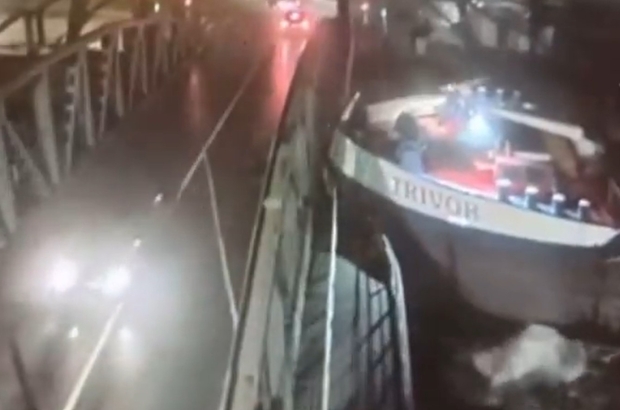- Daily & Weekly newsletters
- Buy & download The Bulletin
- Comment on our articles
Boat hits Brussels canal bridge, with significant economic impact
Damage to the 33-metre-high Buda Bridge over the Brussels Canal is expected to result in a significant economic impact for the region, and if repairs progress slowly, that impact could extend even further.
Shipping traffic on the canal is critical to Brussels, Antwerp and Charleroi, transport economist Christa Sys of the University of Antwerp told Bruzz.
After a ship crashed head-on into the bridge between Christmas and New Year’s Day, transport has dropped from its usual levels.
Sys called the accident highly exceptional, adding that “it therefore points in all likelihood to human error. This is not an infrastructure failure like, for example, metal fatigue of the bridge”.
Assuming the bridge can be repaired quickly, economic damage to the Port of Brussels and the local economy should be kept to a minimum.
This is largely because the accident occurred during the holiday period, which sees less traffic overall.
“Many barge operators are not working then,” said Sys. “Also, the demand for construction materials is lower due to the construction holidays.”
A dozen barges were left stranded at the broken bridge, which is lower than a worst-case scenario given that the bridge usually sees between 10 and 20 barges pass through en route to the port every day. Several motorists were also using the bridge when the incident occurred, and the road support is visibly damaged.
“For now, only the Van Moer terminal cannot be served. Those ships have to unload their cargo in Vilvoorde first and then have trucks cover the last kilometres,” Sys explained.
Despite the lack of a worst-case scenario when it comes to timing, a quick reopening is urgently needed in order to not put Brussels petrol and heating oil supplies at risk, as these mainly arrive by barge.
The bridge is the only passage to the Port of Brussels for cargo traffic from the north, and the only water route for traffic from Antwerp to Charleroi. It is also a major route for traffic headed to France.
Heavy cargo ships cannot make a short detour, only a major one via the Albert Canal over Liège, Namur and Charleroi.
“But then you might be on the road longer than the time it takes to completely remove and repair the bridge deck. So that makes little sense,” Sys pointed out.
“Shipping traffic on the canal and transit traffic towards France is a rabbit hole. This accident shows that one human error can bring the whole traffic to a standstill.”
Repair works started on the Buda bridge in the port of Brussels on Monday, and it remains closed to traffic, both ships and cars, until further notice.
The infrastructure was badly damaged when the vessel collided with the bridge, which was in the down position when struck by the boat.
Attempts to raise the Buda bridge to a higher position failed, leading to a decision to completely remove the bridge deck to clear the waterway as soon as possible. Cables will be removed from the bridge, whereafter cranes will be used to remove the bridge deck.
How long the works will take is not yet clear. The Port of Brussels hopes to allow shipping to resume as soon as possible, in particular out of concern for the 17% of Brussels residents who need access to oil for heating their homes.
Companies that import these products work with a three-day supply, according to Sylvain Godfroid of the Port of Brussels, although residents will not be immediately without heat should that supply run out.
Oil companies will first look for other means of transport.
“They then quickly look at delivery via trucks," says Godfroid. “But that - compared to a cargo ship - is a much more polluting alternative.”
Authorities have launched an investigation into the circumstances of the accident to determine responsibility.
In the meantime, “the Port of Brussels is doing its utmost to find a solution that will allow the resumption of navigation as soon as possible”.

















